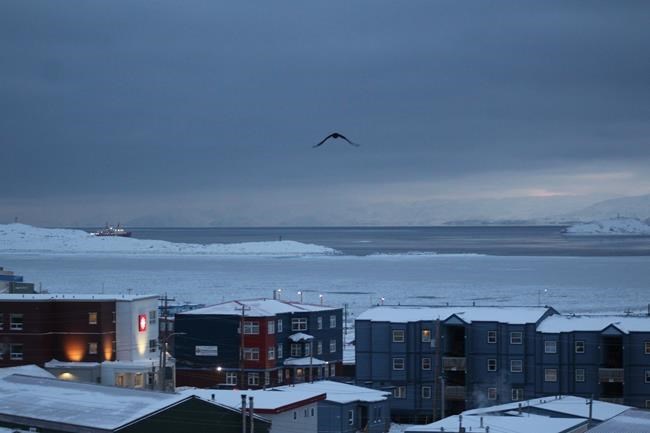
Downtown Iqaluit, Nunavut, is shown after 2 p.m. sunset on Tuesday, Nov. 24, 2020. New cases of COVID-19 are on the rise in Nunavut and the Northwest Territories, causing Iqaluit to declare a state of emergency and Yellowknife to close its schools. THE CANADIAN PRESS/Emma Tranter
Republished May 03, 2021 - 5:08 PM
Original Publication Date May 03, 2021 - 3:41 PM
IQALUIT - Nunavut's capital declared a state of emergency Monday and Yellowknife in the neighbouring N.W.T. closed its schools as news cases of COVID-19 sprang up in both territories.
Iqaluit, a city of about 8,000 people, had 81 of Nunavut's 85 active cases.
Council voted unanimously to declare the local emergency starting at midnight to give the city authority under its Emergency Measures Act to enforce public health order.
"Given the seriousness with the state of affairs with community transmission of COVID-19 in Iqaluit, I will make a motion to declare a state of local emergency," Iqaluit city Coun. Kyle Sheppard said.
It also allows the city to "take additional measures to support the vulnerable population," a news release stated.
Over the weekend, Iqaluit's "low-barrier" shelter, usually open from 8 p.m. to 8 a.m. each day, closed after all four employees went into isolation for COVID-19 and one tested positive. The shelter is the only dedicated place in the city where intoxicated people can stay.
Iqaluit reported its first infection on April 14, but the territory’s chief public health officer has said the virus is likely to already have been in the city a week before that.
Last week, health officials confirmed COVID-19 cases in Iqaluit’s jails and medical boarding home.
The city has been under a strict lockdown that includes school closures and travel restrictions since April 15.
The Northwest Territories also tightened up its public health measures Monday after an outbreak at N.J. Macpherson School. As a result, all schools in Yellowknife were closed indefinitely.
Officials reported 14 cases of confirmed COVID-19 and six probable cases late Monday.
The N.W.T.'s chief public health officer, Dr. Kami Kandola, said earlier in the day that most of the cases were children. Health officials were investigating how the virus entered the school and were working to determine whether the cases are related to an earlier cluster in the city in April.
Kandola said while the N.W.T. is "on the brink of community spread," all cases have so far been linked to the outbreak at the school.
The N.W.T. also said it's working to finalize a deal with British Columbia to get doses of the Pfizer-BioNTech vaccine in exchange for doses of Moderna so teens can be vaccinated.
Only the Moderna vaccine is available in the N. W. T and Nunavut, and it is not yet approved for anyone under 18.
Given the COVID-19 situation in the N.W.T., Nunavut's chief public health officer, Dr. Michael Patterson, suspended the common travel area between the two territories.
Until now, N.W.T. residents could enter Nunavut without isolating. Effective immediately, anyone travelling to Nunavut from the N.W.T. must isolate for 14 days in a designated hotel before entering Nunavut.
There are some exceptions to the new order, including essential workers and medical travelers.
This report by The Canadian Press was first published May 3, 2021.
---
This story was produced with the financial assistance of the Facebook and Canadian Press News Fellowship.
This story was produced with the financial assistance of the Facebook and Canadian Press News Fellowship.
News from © The Canadian Press, 2021